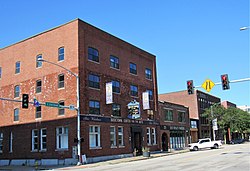United States historic place
| Davenport Motor Row and Industrial Historic District or “Pete Stopulos Row” | |
| U.S. National Register of Historic Places | |
| U.S. Historic district | |
 Buildings on the 200 Block of East Second St. Buildings on the 200 Block of East Second St. | |
  | |
| Location | River Dr., 2nd & 3rd Sts. between Perry & Iowa Sts., Davenport, Iowa |
|---|---|
| Coordinates | 41°31′17″N 90°34′16″W / 41.52139°N 90.57111°W / 41.52139; -90.57111 |
| Area | 10 acres (4.0 ha) |
| Architect | J.W. Ross Clausen & Kruse, et al |
| Architectural style | Italianate Late 19th and 20th Century Revivals Late 19th and 20th Century American Movements |
| NRHP reference No. | 100004113 |
| Added to NRHP | June 27, 2019 |
The Davenport Motor Row and Industrial Historic District or Pete Stopulos Row is a nationally recognized historic district located on the eastern edge of downtown Davenport, Iowa, United States. It was listed on the National Register of Historic Places in 2019.
History
At the time of its nomination it consisted of 28 resources, which included 21 contributing buildings, one contributing site, one contributing structure, and five non-contributing buildings. The area was previously a part of the notorious Bucktown, a district of saloons, beer gardens, brothels, billiard parlors, gambling establishments, and theaters. Davenport licensed prostitution in 1893, gambling in 1904, and failed to enforce Iowa prohibition laws during this period. A crusade against vice by Davenport's Catholic bishop, Henry Cosgrove, and reforms by state leaders led to the district's transformation in the early 20th century into a light industrial area. The city's automobile industry settled here beginning in the 1910s. They stayed until the mid-20th century when Interstate 80 was completed on the north side of the city and they moved to the suburban areas. U.S. Route 32 and its successor U.S. Route 6 passed through the district on East Second Street from 1926 to 1937. The Government Bridge (1896), which for years was the city's only bridge across the Mississippi River, is immediately adjacent to the district.
The district can be divided into two sections based on building usage. On the south side between River Drive and East Second Street are the manufacturing, jobbing, and warehousing buildings. The location of the Chicago, Milwaukee, St. Paul and Pacific rail siding was in the alley, now known as Emerson Place. The alley is the contributing site. To the north between East Second and Third Streets is the location for the automobile industry buildings. These include gas and service stations, auto dealerships, tire and auto parts service and stores, an implement dealership, and a taxi company garage. The elevated rail bridge at East Third and Iowa Streets is the contributing structure. Hose Station No. 1 (1877), which housed automotive uses on its first floor from the 1930s to the 1950s, and the Davenport Bag and Paper Company Building (1907) are individually listed on the National Register of Historic Places. A block north of this historic district is the Crescent Warehouse Historic District, another former light industrial area. The Davenport Downtown Commercial Historic District, a larger commercial district, is immediately to the west.
References
- ^ "National Register of Historic Places Program: Weekly List". National Park Service. June 28, 2019. Retrieved March 20, 2017.
- ^ Jennifer Irsfeld James (August 3, 2018). "National Register of Historic Places Nomination Form: Davenport Motor Row and Industrial Historic District" (PDF). Downtown Davenport, Iowa.
- ^ Alma Gaul (October 25, 2019). "Davenport's 'Motor Row' nabs historic designation". Quad-City Times. Davenport. Retrieved October 28, 2019.
- Jason Hancock. "Highways of Davenport and Bettendorf". The Iowa Highways Page. Retrieved June 29, 2019.
External links
[REDACTED] Media related to Davenport Motor Row and Industrial Historic District at Wikimedia Commons
| U.S. National Register of Historic Places | |
|---|---|
| Topics | |
| Lists by state |
|
| Lists by insular areas | |
| Lists by associated state | |
| Other areas | |
| Related | |
This article about a property in Scott County, Iowa on the National Register of Historic Places is a stub. You can help Misplaced Pages by expanding it. |
